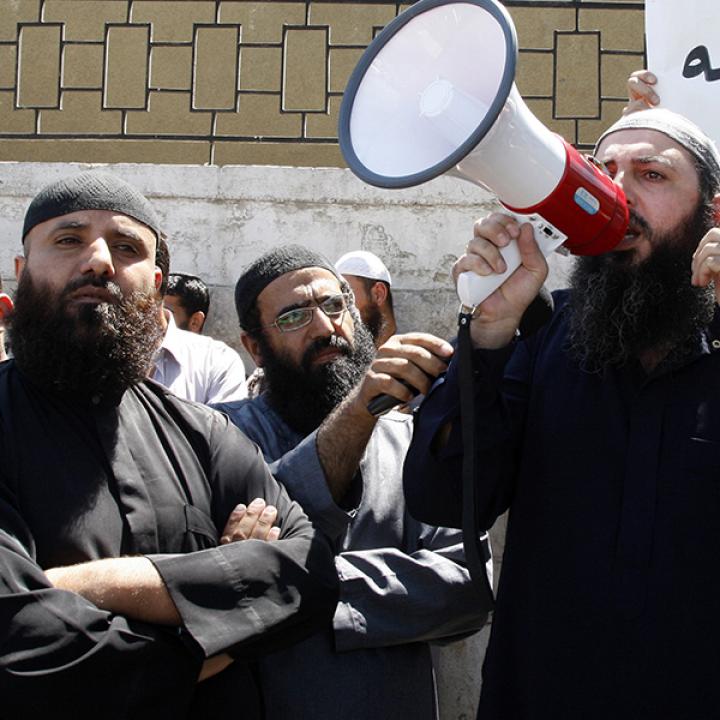
- Policy Analysis
- PolicyWatch 2747
The Growing Islamic State Threat in Jordan

Amman has shaken up its counterterrorism and military leadership in response to an uptick in attacks and security failures, and Washington cannot afford to be complacent about the kingdom's situation either.
In mid-December, an Islamic State (IS) attack and subsequent manhunt in the southern Jordanian town of Karak killed seventeen people and injured thirty-four, highlighting the kingdom's dramatic rise in terrorist activity over the past year. Between attacks and interdiction operations, nearly thirty Jordanian civilians and security officials were killed in 2016, along with three American soldiers and a Canadian tourist. In contrast, data from the U.S. State Department indicates that only one terrorist incident occurred on Jordanian soil in 2015 (though at least one large IS plot was disrupted that year).
Despite these difficulties, Jordan remains an island of stability in a turbulent region and a key ally in the fight against IS. Yet with no end in sight to the war in Syria or its terrorist spillover, 2017 promises to be an even more challenging year for Jordanian counterterrorism efforts -- a struggle that has potential political implications for the palace.
A YEAR OF PLOTS
Throughout 2016, the Jordanian press reported frequently on arrests, trials, and incarcerations of Islamist militants, both locals and Syrian nationals. Most prominently, security forces in the northern town of Irbid killed seven IS terrorists in March, purportedly as they were concluding the final stages of operational planning for an attack. More recently, after an explosion in an apartment tipped off authorities in December, IS terrorists went on their hostage-taking rampage in Karak, killing several civilians along with security and special forces operators. Press reports indicated that the cell -- which included a Jordanian previously arrested and released after trying to join the jihad in Syria -- had been planning to attack targets on New Year's Eve.
Beyond targeting civilians, IS operatives focused on Jordanian security installations last year. On June 6, a lone attacker entered a General Intelligence Directorate (GID) complex in the Baqaa refugee camp twenty minutes north of Amman, shooting and killing five officers before escaping. Two weeks later, operatives detonated a car bomb at a Jordanian military base in Rukban on the Syrian border, killing six soldiers. And in November, a radicalized Jordanian soldier on guard duty at al-Jafr Air Base apparently murdered three U.S. Special Forces soldiers, though the final findings of the official investigation have not yet been released. If the latter information is confirmed, five Americans in uniform will have been killed in Jordan in so-called "green on blue" attacks in the span of twelve months -- more than in Afghanistan during the same period.
READINESS QUESTIONS, SECURITY SHAKEUPS
The spike in arrests of purported Islamist militants likely reflects both the increased threat and heightened level of vigilance in the kingdom. Notwithstanding the many counterterrorism successes, however, Jordan's security apparatus seemed to underperform in several instances. During the June attacks in Baqaa and Rukban, for example, facility guards were reportedly asleep at their posts. In March, the 71st Counterterrorism Battalion's raid on the IS cell in Irbid was apparently plagued by communications problems that contributed to the exchange of "friendly fire" between soldiers and gendarmerie units. And following the December crisis in Karak, YouTube videos surfaced of police officers shouting from the windows of the local station house, pleading with local citizens for more weapons and ammunition.
Interior Minister Salameh Hammad subsequently denied the Karak police were under-gunned, declaring the security operation there a "success." But skepticism persists. Earlier this month, forty-eight members of parliament pressed for a no-confidence vote to remove Hammad from his post. Although they later shelved that demand, they still called for a committee to investigate both him and the overall government response in Karak. Local observers widely believe that he will soon be gone in a government reshuffle.
Hammad might not be the only senior security official facing dismissal. Ever since the New York Times reported in June that the GID had syphoned off thousands of CIA-supplied AK-47 assault rifles intended for moderate Syrian rebels, rumors have swirled in Amman that directorate chief Faisal Shobaki would be replaced. That conspiracy was of particular embarrassment to the palace because one of the weapons was eventually purchased on the black market and used by a radicalized Jordanian officer to kill two Americans, two South African instructors, and two Jordanians at a police training facility.
Amman has also made significant leadership changes in the Jordan Armed Forces after two years of controversies, including the attack in Rukban, the disappearance of 87,000 bullets belonging to the British Army during joint desert exercises near Aqaba, and the loss of at least four of Jordan's F-16 fighter jets due to pilot error or mechanical failure -- more than 6 percent of its total inventory. In an unprecedented move, King Abdullah dismissed the military's entire general staff in November and issued a gag order prohibiting Jordanian print and electronic media from reporting on the armed forces. While these flag officers were all overdue for retirement, the mass firing and media blackout suggested a loss of confidence in the kingdom's top brass.
POLICY IMPLICATIONS
For Washington, the uptick in terrorist incidents and Jordan's sometimes-hesitant response should be cause for concern. To be sure, these attacks do not imminently threaten the stability of a country that has proven remarkably resilient to terrorism. But the ongoing security incidents complicate Amman's efforts to contend with other pressing challenges, including the anemic economy, extremely high unemployment, and the accommodation of more than a million Syrian refugees. Worse, the seemingly interminable war next door in Syria appears to be radicalizing more Jordanians. The country's jails are reportedly teeming with prisoners whom the State Security Court has charged with expressing sympathy for IS on the Internet. An estimated 2,500 Jordanians have already joined the jihad in Syria, fighting alongside IS and local al-Qaeda affiliates.
Although Jordan's security apparatus remains committed, loyal, and generally effective, ranking among the best in the region, it is no panacea for the country's problems. Based on the current trend line, 2017 is likely to be another difficult year for the kingdom. Fortunately, if the recent military shakeup was any indication, King Abdullah is not complacent about Jordan's security.
Washington cannot afford to be complacent either. Not only is Jordan a critical voice of religious moderation in a region brimming with Islamist militancy, it also serves as a principal base of U.S. air operations against IS in Syria. Recognizing the kingdom's importance, Washington provided $1.6 billion in assistance in 2016, including nearly $800 million in military aid. This level of assistance is well warranted given the value and rarity of stable, pro-Western allies in the Middle East.
Maintaining the U.S. military presence on Jordanian soil is also a must, despite the growing cost in blood and treasure. These U.S. forces play a crucial part in rolling back IS in Syria, providing indispensable training, and serving as a force multiplier in the kingdom. After years of questionable U.S. commitment to regional allies, the deployment in Jordan -- coupled with extremely generous military and financial assistance -- is a critical symbol of Washington's enduring commitment to the country's stability, moderation, and pro-U.S. orientation. In the coming months, the Trump administration will likely reassess some longstanding regional obligations. Jordan is one friend in need that should remain a top priority.
David Schenker is the Aufzien Fellow and director of the Program on Arab Politics at The Washington Institute.



